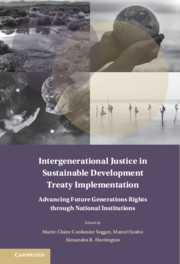 Intergenerational Justice in Sustainable Development Treaty Implementation
Intergenerational Justice in Sustainable Development Treaty Implementation from Comparative Insights
Published online by Cambridge University Press: 15 October 2021
Arrival of the Anthropocene has focused attention on human beings’ impacts on functioning global ecosystems and made increasingly urgent the need to focus on global institutional reform. The Anthropocene involves the notion that we have entered into a new era in which human beings have permanently modified global ecosystems, including the climatic system. Evidence mounts that the Earth’s climatic system is approaching tipping points with potentially catastrophic consequences. This has led John Dryzek to call for a rethink of political institutions appropriate for this new era based on ‘ecosystemic reflexivity’ as a first overriding virtue. ‘Ecosystemic reflexivity’ involves incorporating better ways of listening to ecological systems with broader participation – taking in both nature and future generations – into human institutions.
To save this book to your Kindle, first ensure [email protected] is added to your Approved Personal Document E-mail List under your Personal Document Settings on the Manage Your Content and Devices page of your Amazon account. Then enter the ‘name’ part of your Kindle email address below. Find out more about saving to your Kindle.
Note you can select to save to either the @free.kindle.com or @kindle.com variations. ‘@free.kindle.com’ emails are free but can only be saved to your device when it is connected to wi-fi. ‘@kindle.com’ emails can be delivered even when you are not connected to wi-fi, but note that service fees apply.
Find out more about the Kindle Personal Document Service.
To save content items to your account, please confirm that you agree to abide by our usage policies. If this is the first time you use this feature, you will be asked to authorise Cambridge Core to connect with your account. Find out more about saving content to Dropbox.
To save content items to your account, please confirm that you agree to abide by our usage policies. If this is the first time you use this feature, you will be asked to authorise Cambridge Core to connect with your account. Find out more about saving content to Google Drive.